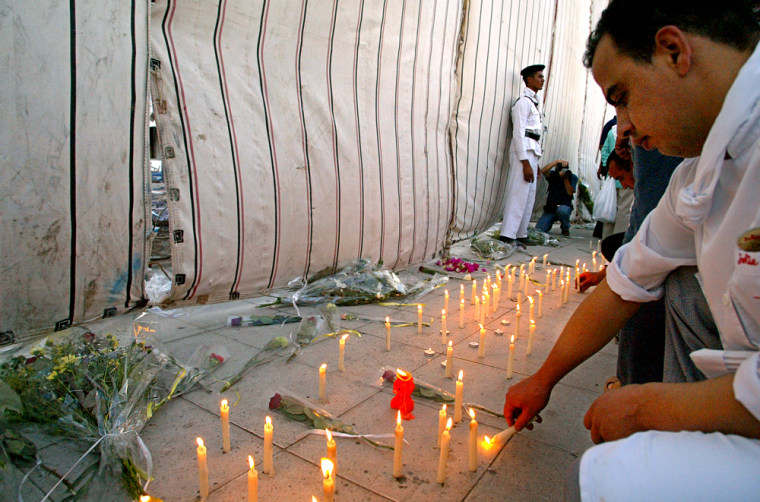Stunned by terror attacks in a Red Sea resort, Egyptians are in a remarkably frank debate about whether mosques and schools — and the government itself — should be blamed for promoting Islamic extremism.
Even pro-government media say authorities have created a climate where young people are turning into radicals and suicide bombers.
In a country more used to hearing general condemnations of terrorism, critics on Wednesday were angry — and specific — hammering at instances where they say the government allowed mosque preachers or state media to promote intolerance.
At one mosque in Cairo, some worshippers objected to prayers for the dead and missing after Saturday’s bombings in Sharm el-Sheik because some victims were likely non-Muslims, said the editor of the government weekly Al-Musawwar.
Another columnist pointed to a weekly column in the government Al-Ahram daily by a religious scholar, Zaghloul al-Naggar, who explains science by using the Quran. After December’s tsunami in the Indian Ocean, he went on Arab television and called the devastation God’s revenge on Westerners engaged in vice.
A need for reform?
The debate since Sharm has been a deepening of the soul-searching that has gone on across the Arab world in recent years over whether religious interpretations need reform in the face of terror attacks by Muslim radicals.
The debate began, hesitantly, after the Sept. 11, 2001 attacks on the United States. And the voices have grown with each act of terrorism — particularly ones in the Middle East. A series of attacks in Saudi Arabia in 2003 forced that country to begin taking action against extremist thought.
The 2004 Madrid bombings increased calls for change among Muslims in Europe and the Mideast. After the July 7 suicide bombings in London, Britain’s largest Sunni group issued a binding religious edict, known as a fatwa, condemning the attack.
Egypt has been hit this month by a double blow: the kidnapping and slaying of its top envoy in Iraq by Islamic militants and the bomb blasts that ripped through Sharm, killing as many as 88 people — the vast majority of them Egyptians.
Rare self-criticism
What was unusual about the self-criticism after Sharm was that it came from government media — and even from within the Islamic clerical hierarchy picked by the government.
“There is no use denying. ... We incited the crime of Sharm el-Sheik,” ran a bold red headline of a lead editorial Wednesday by Al-Musawwar’s editor in chief, Abdel-Qader Shohaib.
The bombers “didn’t just conjure up in our midst suddenly, they are a product of a society that produces extremist fossilized minds that are easy to be controlled,” Shohaib wrote.
In Al-Ahram, columnist Ahmed Abdel Moeti Hegazi wrote: “This is not just deviation, it is a culture,”
Hegazi said he went to one mosque after the July 7 London bombings and the slaying of the Egyptian diplomat but the preacher made no mention of either attack. Instead, he denounced women wearing bathing suits.
Unresolved conflict in the mosques
Abdel Moeti Bayoumi, a theology professor at Al-Azhar University and a member of Al-Azhar’s Center of Islamic Research, said change is needed. Al-Azhar, in Cairo, is one of the leading Sunni Muslim institutions in the world.
“Islamic preaching institutions are in a very acute need for shake-up, “ Bayoumi told The Associated Press. “Issuing statements and holding conferences to condemn terrorism is not what is needed. They are more like a cover-up of unresolved problems.”
Islamic leaders “need to do a lot of work to enlighten clerics and preachers and educate them about the true religious ideas ... and teach them about the realities of the age we’re living in,” he said.
The government appoints the clerics of most big mosques in Egypt — but not of many smaller mosques. The Religious Affairs Ministry gives guidelines for Friday sermons, but there is no guarantee they are followed.
Critics have complained about the justifications of violence in Iraq by some clerics. Egyptian cleric Sheik Youssef al-Qaradawi — who has a regular show on the Arab satellite channel Al-Jazeera — has issued a fatwa saying that since Iraq remains in a state of war, the kidnapping of those involved is allowed, but hostages shouldn’t be killed. He repeated that stance Monday, two days after the Sharm attacks.
Blaming Mubarak
Not all are convinced that Islam needs reform, however.
Kamal Habib — a former member of Egypt’s Islamic Jihad militant group who was jailed from 1981 to 1991 along with al-Qaida leader Osama bin Laden’s deputy, Ayman Al-Zawahri — denounced the critics as “secular extremists who hate religion.”
He blamed terrorism, instead, on Egyptian President Hosni Mubarak’s autocratic rule.
“Mubarak’s regime has produced this generation. ... This is a nihilistic generation of a nihilistic regime.”
